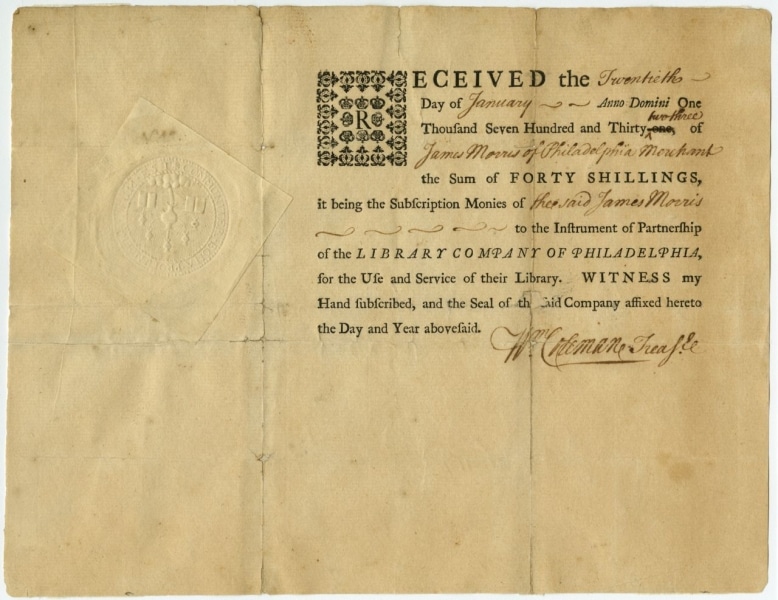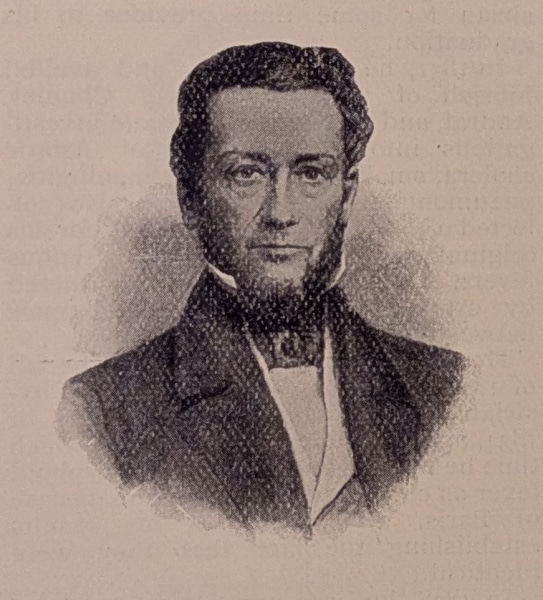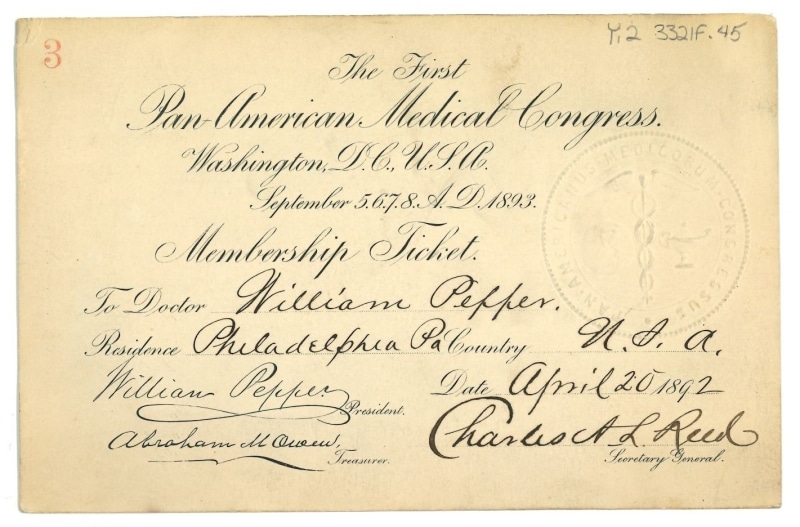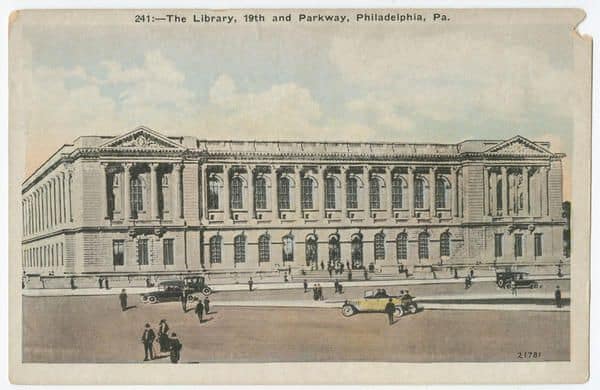Shareholder Spotlight: Dr. William Pepper (1843-1898)
Dana Dorman, Archivist, Library Company Papers Project

Image: Receipt for a Library Company share, 1733.
We continue our monthly “Shareholder Spotlight” series by taking a closer look at share #593 and its ninth owner, Dr. William Pepper (1843-1898).
Shareholders have always been the backbone of the Library Company of Philadelphia. Starting with the first group of fifty tradesmen who formed the library in 1731, shareholders have provided crucial financial support each year for our mission to “pour forth benefits for the common good.”
We keep careful track of who has owned each historic share, and our list of 9,800+ shareholders includes signers of the Declaration and Constitution, merchants, doctors, soldiers, scientists, artists, philanthropists, politicians, and much more.
Share #593
This share was first issued to Dr. Charles Moore on April 6, 1790.
Less than a year earlier, the Directors of the Library Company had gotten approval from its members to sell as many new shares as possible to help raise funds for their planned building at 5th and Chestnut Streets. Moore was the 91st person to purchase one of those new shares, and the new building opened on New Year’s Day in 1791.[i]
The Library Company’s records provide no further detail about Moore, but the 1791 Philadelphia Directory lists him as a “doctor of physic” based on North Seventh Street.
He maintained his Library Company share for five years, and eventually sold the share to Maria O’Brien on June 15, 1795.
The share passed through five additional owners before it was purchased by Dr. William Pepper (1810-1864) on February 5, 1858.
By the time Dr. Pepper acquired this share, he was well-established as a physician in Philadelphia. By 1858, he had been a fellow at the College of Physicians for 19 years, and had served as one of the Visiting Physicians to the Pennsylvania Hospital for 16 years. He stepped down from the hospital at the end of the year he acquired his Library Company share, but two years later, he was named as Professor of the Theory and Practice of Medicine at the University of Pennsylvania.[ii]

Image: This portrait of Dr. William Pepper (1810-1864) appears on page 509 in Thomas G. Morton and Frank Woodbury, The History of the Pennsylvania Hospital (Philadelphia, 1897).
Dr. Pepper maintained share #593 until his death in 1864, and then his estate continued to maintain ownership of the share for another 35 years.
His son and executor Dr. William Pepper (1843-1898) eventually transferred the share from the estate to himself on November 11, 1897. Library Company records provide no further information about what spurred this transaction, but the younger Pepper died the next year.
The younger Dr. Pepper was also a physician. He worked as a lecturer and then professor at the medical school at the University of Pennsylvania, and eventually opened the Hospital of the University of Pennsylvania. In 1881, he was elected the eleventh Provost for the university. When he stepped down 14 years later, his leadership had helped the university to evolve into a more modern institution, including expanding from 42 faculty to 245.[iii]

Image: The younger Dr. Pepper gifted his membership ticket to the first Pan-American Medical Congress to the Library Company. Pepper had helped organize the congress and served as its president. The first Pan-American Medical Congress membership ticket (Washington, D.C., 1892). Gift of William Pepper.
He was a member of the American Philosophical Society and the College of Physicians, and served as the Medical Director of the Centennial Exposition of 1876. He helped found the University of Pennsylvania Archaeological Museum in 1887, the Wistar Institute in 1894, and the Philadelphia Commercial Museum in 1898.[iv]
The younger Dr. Pepper was also instrumental in the founding of the Free Library of Philadelphia. After Pennsylvania regulated municipal libraries in 1887, Dr. Pepper worked for the creation of a free city library.[v]
These efforts to create a “free” library were certainly noticed by the Directors of the Library Company, which had been a subscription-based institution for 150 years by then.
The minutes of a special Directors meeting held in 1887 noted, “Much attention of late has been directed to the importance and necessity of establishing Free Libraries, and there can be no question that the public would be largely benefited by placing within reach of all the means of mental improvement without charge.” However, the Directors argued that it would be too expensive to establish “absolutely free” libraries, and instead urged Philadelphians to “support liberally the institutions now existing in our city with a view of increasing their usefulness.”[vi]
The younger Dr. Pepper was not deterred. He successfully persuaded his wealthy uncle George S. Pepper (1808-1890) to leave a large bequest to support a “free” library in Philadelphia, and the Free Library of Philadelphia was chartered in 1891.[vii]

Image: After operating in several previous locations, the Free Library of Philadelphia opened its Central Branch at 19th and Benjamin Franklin Parkway in 1927. Central Library, Free Library of Philadelphia postcards [graphic] (circa 1927). Photolithograph.
Of course, even as Dr. Pepper urged the creation of a city library in the late 1880s, he personally still had access to the Library Company of Philadelphia’s holdings through his father’s estate, which owned share #593 until 1897.[viii]
The younger Dr. Pepper lived only one year after transferring the Library Company share into his own name. His estate executors maintained the share in his name for another 50 years after his death, finally transferring the share to his grandson “William Pepper Jr.” on June 3, 1948.[ix]
The share has been owned by 13 people total in its history.
Not yet a shareholder?
Share #593 is currently available. We work hard to match potential shareholders with historic shares that match their interests, and we would love to match you with Dr. William Pepper’s share or another option.
You can become a Library Company shareholder with an initial gift of $500. To learn more, visit our website or reach out to our Development Office at development@librarycompany.org.
—–
[i] June 1, 1789 minutes, Directors Minutes Volume 3, volume 165, Library Company of Philadelphia records (MSS00270).
[ii] Thomas S. Kirkbride, Biographical Memoir of the Late William Pepper, M.D. (Philadelphia, 1866).
[iii] Finding aid, Office of the Provost Records, William Pepper Administration (UPA 6.2Pep), University of Pennsylvania Archives and Records Center.
[iv] Ibid.
[v] “History Overview,” Free Library of Philadelphia, https://libwww.freelibrary.org/digital/feature/75th/history (accessed December 5, 2024).
[vi] March 14, 1887 minutes, Directors Minutes Volume 9, Library Company of Philadelphia records (MSS00270).
[vii] “History Overview.”
[viii] The Free Library itself eventually became an institutional shareholder of the Library Company. It owned share #851 from 1899 until 1929, and then owned share #269 for many decades after that.
[ix] It’s possible that the Pepper family assumed each of the four generations named “William Pepper” took ownership of the share, but didn’t bother with the official Library Company paperwork for those transfers. The last share transfer to “William Pepper Jr.” in 1948 was one year after the death of Dr. William Pepper III (1874-1947). Perhaps William Jr. thought he was purchasing his father’s, not his grandfather’s, share.


